A Community in Action
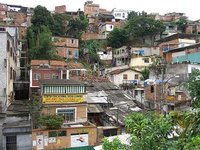 This afternoon I visited an infamous favela in Rio, called Morro do Alemão, with three young Americans who've arrived in Rio for the first time over these past few weeks: Rafael Rivero, CatComm's International Outreach Intern for the summer, a Swarthmore College Evans Scholar and upcoming Sophomore; Liesl Bradford, who worked until recently at Campaign for Tobacco-Free Kids in Washington, DC; and Susan Reynolds, a Registered Nurse in Washington, DC, shortly to be starting her Masters in Nursing at John's Hopkins University in Baltimore.
This afternoon I visited an infamous favela in Rio, called Morro do Alemão, with three young Americans who've arrived in Rio for the first time over these past few weeks: Rafael Rivero, CatComm's International Outreach Intern for the summer, a Swarthmore College Evans Scholar and upcoming Sophomore; Liesl Bradford, who worked until recently at Campaign for Tobacco-Free Kids in Washington, DC; and Susan Reynolds, a Registered Nurse in Washington, DC, shortly to be starting her Masters in Nursing at John's Hopkins University in Baltimore.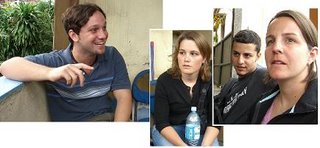 Interestingly enough, our host was also an American -- Zak Paster -- who, over the past few years, has established an innovative community program here. Called Community in Action, the NGO Zak helped found has supported some 400-500 community residents over the past year (since it started operating) on just US$800/month. Community in Action needs only one employee since it operates on a clear strategy of low-budget sustainability: they offer a community space where local volunteers are recruited to offer capacity-building courses to their peers: fellow community residents.
Interestingly enough, our host was also an American -- Zak Paster -- who, over the past few years, has established an innovative community program here. Called Community in Action, the NGO Zak helped found has supported some 400-500 community residents over the past year (since it started operating) on just US$800/month. Community in Action needs only one employee since it operates on a clear strategy of low-budget sustainability: they offer a community space where local volunteers are recruited to offer capacity-building courses to their peers: fellow community residents.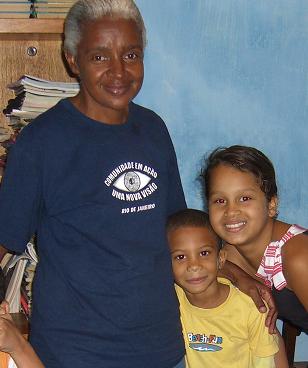 Community in Action doesn't promise its volunteers salaries. Rather, the organization develops strong bonds with volunteers by supporting them in other ways, as means permit. Sometimes this means offering the families of volunteers a basket with monthly staples (beans, rice, oil, etc.), called a cesta básica. In one case the organization mobilized to help build a house for one of its most critical volunteers, Ana, who tutors youth in the afternoons [on a side note, we were later able to visit Ana's new home, now only in need of paint; there, we overheard a confrontation between police and local drug traffickers -- an attestment to the reality that locals live, and to the importance of efforts like this].
Community in Action doesn't promise its volunteers salaries. Rather, the organization develops strong bonds with volunteers by supporting them in other ways, as means permit. Sometimes this means offering the families of volunteers a basket with monthly staples (beans, rice, oil, etc.), called a cesta básica. In one case the organization mobilized to help build a house for one of its most critical volunteers, Ana, who tutors youth in the afternoons [on a side note, we were later able to visit Ana's new home, now only in need of paint; there, we overheard a confrontation between police and local drug traffickers -- an attestment to the reality that locals live, and to the importance of efforts like this].Volunteers are asked to offer a course, whether over a short period (like a month) or ongoing. They are also asked to bring 2 participants to help get the course off the ground. Zak finds that by focusing on quality and small details, the project expands by word-of-mouth. "We've found that formal outreach rarely works," he told us.
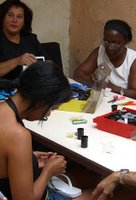
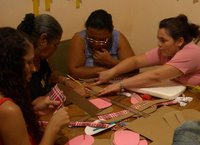 Though they've offerred low-cost English classes in the past, provide afterschool tutoring, and have volunteers teaching income-generating skills like bead-making for sandals, creative box design and adaptive reuse of newspapers, Zak believes "the future of Community in Action lies in computer trainings." They've experienced enormous demand from youth and residents interested in their volunteer-run computer courses.
Though they've offerred low-cost English classes in the past, provide afterschool tutoring, and have volunteers teaching income-generating skills like bead-making for sandals, creative box design and adaptive reuse of newspapers, Zak believes "the future of Community in Action lies in computer trainings." They've experienced enormous demand from youth and residents interested in their volunteer-run computer courses.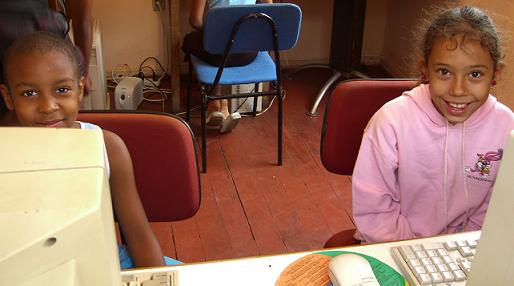
Zak has been able to set the stage so that Community in Action can run with him at a distance. He will be starting an MBA at University of North Carolina in the Fall. Part of the model he's developed involves attracting volunteers from the US and elsewhere who have a background in administration to spend time in Rio, rotating in shifts of 6 months apiece, helping manage the project and making the bridge between the local program and supporters in the US. Rajan Kapoor is the current volunteer who's arrived to provide this support over the coming months.
Originally from Wisconsin, Zak often returns to his roots where he holds benefit parties and organizes other events to link Americans with Community in Action, offering them a means by which they can directly support community efforts, without having to invest in large organizations with large bureaucracies. He provides a social investment where a funder's $100 check goes a very long way, indeed.
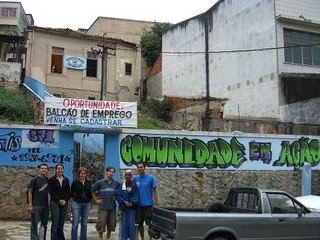 Of the 115+ projects today posted in CatComm's Community Solutions Database, Community in Action is to date the only Rio-based program founded in part by an American. It provides a fascinating view of how foreigners who fall in love with the city can find long-term strategies to make a difference. Catalytic Communities is proud to have supported Community in Action over the past couple of years as a fiscal sponsor, facilitating American donors' support of this important project in Rio de Janeiro. Congratulations to Community in Action for having raised over US$15,000 to support the residents of Morro do Alemão over the past year!
Of the 115+ projects today posted in CatComm's Community Solutions Database, Community in Action is to date the only Rio-based program founded in part by an American. It provides a fascinating view of how foreigners who fall in love with the city can find long-term strategies to make a difference. Catalytic Communities is proud to have supported Community in Action over the past couple of years as a fiscal sponsor, facilitating American donors' support of this important project in Rio de Janeiro. Congratulations to Community in Action for having raised over US$15,000 to support the residents of Morro do Alemão over the past year!


<< Home